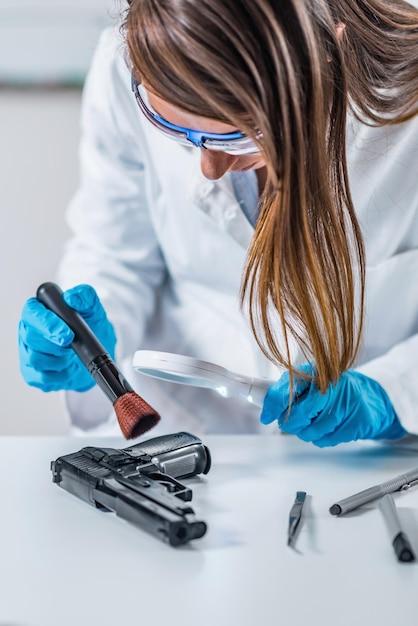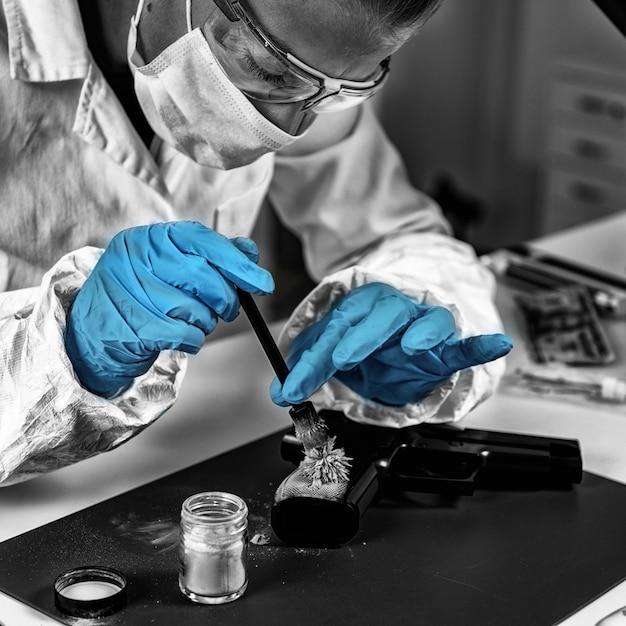Forensic science, the captivating field where science and investigation intertwine, has become an integral part of our society. With its ability to provide crucial evidence, solve mysteries, and bring criminals to justice, the impact of forensic science is undeniable. From determining the cause of death to analyzing fingerprints and DNA, this fascinating discipline plays a pivotal role in the criminal justice system.
Have you ever wondered how many types of forensic science there are? Or perhaps you’re curious about the techniques used in this field? This blog post will provide you with a comprehensive overview of the importance of forensic science in criminal investigations, the various types of forensic science, the techniques employed, and its impact on society.
Whether you are considering a career in forensic science or simply intrigued by this captivating field, join us as we delve into the world of forensic science and unravel its secrets.
The Impact of Forensic Science on Society
Forensic science may conjure up images of crime scene investigations and thrilling detective stories, but its impact on society goes far beyond entertainment. In fact, this multidisciplinary field plays a vital role in our justice system, providing invaluable tools and expertise that shape legal outcomes. From solving crimes to exonerating the innocent, forensic science has become an indispensable part of our society in more ways than one.
Uncovering the Truth with Fingerprint Analysis
Fingerprint analysis, one of the most well-known techniques in forensic science, has revolutionized criminal investigations. By examining the unique ridge patterns on our fingertips, forensic experts can identify and match prints found at crime scenes. This powerful tool helps distinguish the guilty from the innocent, ensuring justice is served. Just like snowflakes, no two fingerprints are alike, making this method a cornerstone of forensic science.
DNA Analysis: Space-Age Technology in the Courtroom
The advent of DNA analysis has transformed the field of forensic science, providing unparalleled accuracy and reliability in identifying individuals. Whether it’s analyzing blood, semen, or hair samples, DNA testing allows investigators to link suspects to crime scenes and confirm or refute their involvement. Moreover, it has played a crucial role in exonerating wrongfully convicted individuals, bringing justice and peace of mind to those who have suffered a grave miscarriage of justice.
From Entomology to Anthropology: The Secrets Hidden in Nature
Forensic entomology, the study of bugs, and forensic anthropology, the study of human remains, both serve as invaluable sources of evidence in criminal investigations. By observing insect activity on a corpse, entomologists can determine the postmortem interval, shedding light on when a victim met their demise. Meanwhile, anthropologists employ their expertise to examine bones and provide crucial insights into the identity, cause of death, and other vital information for building a case.
Ballistics: Bringing Order to Chaos
Ballistic analysis allows forensic experts to match firearms and ammunition to crime scenes, helping unravel the mysteries behind gun-related crimes. By analyzing spent casings, bullet trajectories, and other evidence, ballistic experts can determine the type of weapon used and link it to suspects or other crime scenes. This branch of forensic science helps reconstruct events, identify perpetrators, and counter false alibis, ensuring that the truth prevails.
The Power of Forensic Psychology
While physical evidence often takes center stage, forensic psychology plays a crucial role in understanding criminal behavior and providing insights into cases. Forensic psychologists evaluate suspects’ mental states, assess their competency to stand trial, and provide expert testimony on matters such as trauma and memory. Their expertise helps inform legal decisions and ensures that justice is served with a comprehensive understanding of the human mind.
Closing Thoughts
From the minute details of fingerprints to the vast complexity of DNA analysis, forensic science has made tremendous strides in helping society solve crimes and achieve justice. Its impact stretches beyond the confines of the courtroom and permeates our collective consciousness, fostering trust in the legal system and offering hope for the wrongfully accused. The ongoing advancements in forensic science continue to shape our society, inspiring awe and ensuring a safer, more just world for all.
Remember, the truth may be stranger than fiction, but it’s forensic science that untangles the web of mysteries and delivers justice!
FAQ: What Impact Does Forensic Science Have on Society
Introduction
Forensic science is not just a popular crime show genre; it plays a crucial role in solving crimes and ensuring justice is served. With its various techniques and methods, forensic science contributes significantly to society. In this FAQ-style section, we will answer some commonly asked questions about the impact of forensic science on society. So, let’s dive right in!
What is the importance of forensic science in criminal investigation
Forensic science is vital in criminal investigations as it helps uncover evidence and analyze crime scenes scientifically. By examining physical evidence such as fingerprints, DNA, fibers, and ballistics, forensic scientists assist law enforcement agencies in building strong cases against criminals. From identifying suspects to determining the cause of death, forensic science plays a fundamental role in bringing criminals to justice.
How many types of forensic science are there
Wow, there are quite a few! Forensic science encompasses various specialized fields, including forensic toxicology, forensic DNA analysis, forensic anthropology, forensic entomology, forensic psychology, digital forensics, and many more. Each field focuses on a specific aspect of crime investigation, making forensics a diverse and exciting field to explore!
How can I get admission in forensics after 12th
If you’re interested in pursuing a career in forensic science after 12th grade, you’re on the right track! To get admission, you should look for universities or colleges offering courses in forensic science. Some prestigious institutes even offer specialized bachelor’s degrees in forensic science itself. Keep an eye out for entrance exams and meet the required eligibility criteria to secure a seat in the program of your choice.
What techniques are used in forensic science
Forensic science employs a range of techniques to analyze evidence. Here are a few:
- Fingerprint Analysis: Fingerprints are unique to individuals and are used to link suspects to crime scenes.
- DNA Profiling: Through DNA analysis, forensic scientists can match DNA samples to suspects or victims, aiding in identification and exclusion.
- Ballistics: By examining firearms, bullets, and casings, forensic scientists can determine if a particular weapon was used in a crime.
- Toxicology: This technique involves testing body fluids and tissues for the presence of drugs, alcohol, or poisons.
- Forensic Odontology: Dental evidence can help in identifying human remains through dental records and bite mark analysis.
Is forensic science in demand
Absolutely! With the ever-evolving advancements in technology and an increased emphasis on solving crimes, the demand for forensic scientists is on the rise. From police departments to federal agencies, forensic scientists are in high demand to assist in criminal investigations. So, if you have a passion for science and problem-solving, a career in forensic science could be a perfect match!
What impact does forensic science have on society
Forensic science has a profound impact on society. It not only helps solve crimes and ensure justice but also provides closure to victims and their families. By using scientific methods to analyze evidence, forensic scientists contribute to the integrity of the judicial system. Their work helps prevent wrongful convictions and supports the overall safety and well-being of society.
How long does it take to become a forensic scientist
Becoming a forensic scientist requires dedication and education. Typically, it takes around four years to obtain a bachelor’s degree in forensic science. However, some positions may require further specialization, which can involve additional years of study or training. So, buckle up and get ready for an exciting journey ahead!
Does forensic science require NEET
NEET (National Eligibility cum Entrance Test) is an entrance examination for medical courses in India. Forensic science, although a scientific field, does not usually require NEET for admission. However, it’s important to check the specific requirements of the university or program you wish to pursue, as they may have their own entrance exams or eligibility criteria.
What are 3 main DNA typing techniques
When it comes to DNA typing, forensic scientists primarily rely on three techniques:
- Restriction Fragment Length Polymorphism (RFLP): This technique analyzes differences in DNA fragment sizes to identify variations in genetic sequences.
- Short Tandem Repeat (STR) Analysis: STR analysis examines specific regions of DNA by counting the number of repeating units, providing valuable information for identification purposes.
- Polymerase Chain Reaction (PCR): PCR is a powerful technique that amplifies small DNA samples, allowing forensic scientists to generate sufficient material for testing and analysis.
Which course is best for forensic science
When it comes to choosing the best course for forensic science, it depends on your interests and career goals. Many universities offer bachelor’s degrees in forensic science, which provide a comprehensive foundation. However, you can also pursue courses in related fields such as chemistry, biology, or criminal justice, followed by a specialization in forensic science at the postgraduate level. The key is to select a program that aligns with your passions and offers the necessary knowledge and skills for your desired career path.
How hard is it to get a job in forensic science
Securing a job in forensic science can be competitive, but it’s definitely not impossible. The field attracts many passionate individuals, and employers often seek candidates with a combination of theoretical knowledge and practical experience. Gaining hands-on experience through internships, research projects, or volunteering can significantly enhance your chances of landing a job in forensic science. So, put your detective hat on and start building a strong foundation for your future career!
Is a forensic scientist a good career
Absolutely! A career in forensic science can be incredibly fulfilling and rewarding. It offers you the opportunity to contribute to society by assisting in investigations and bringing criminals to justice. Moreover, with advancements in technology and ongoing research, the field of forensic science is continually evolving, making it an exciting career choice. So, if you have a passion for science and a fascination with solving mysteries, a forensic scientist career might just be the perfect fit for you!
How do you study forensics
Studying forensics involves a combination of classroom learning and hands-on experience. During your academic journey, you’ll delve into various scientific disciplines, such as biology, chemistry, and physics, while also taking specialized forensic science courses. These courses may cover topics like crime scene investigation, evidence analysis, and forensic techniques. Additionally, internships, research projects, and practical training will provide you with invaluable skills and real-world experience to excel in the field of forensics.
Conclusion
Forensic science plays a crucial role in our society, contributing to the investigation and resolution of crimes. From the impact on criminal investigations to the demand for forensic scientists, we’ve addressed several frequently asked questions about the impact of forensic science on society. So, if you’ve ever wondered about the inner workings of this fascinating field, we hope this FAQ-style section has shed some light. Remember, forensic science isn’t just about the TV dramas; it’s an integral part of our pursuit of truth and justice!

